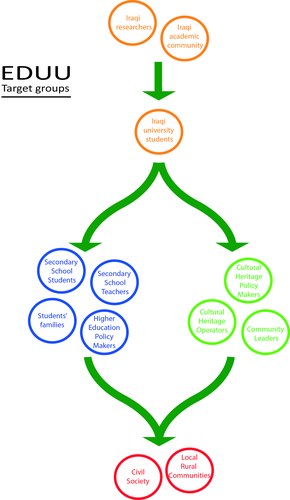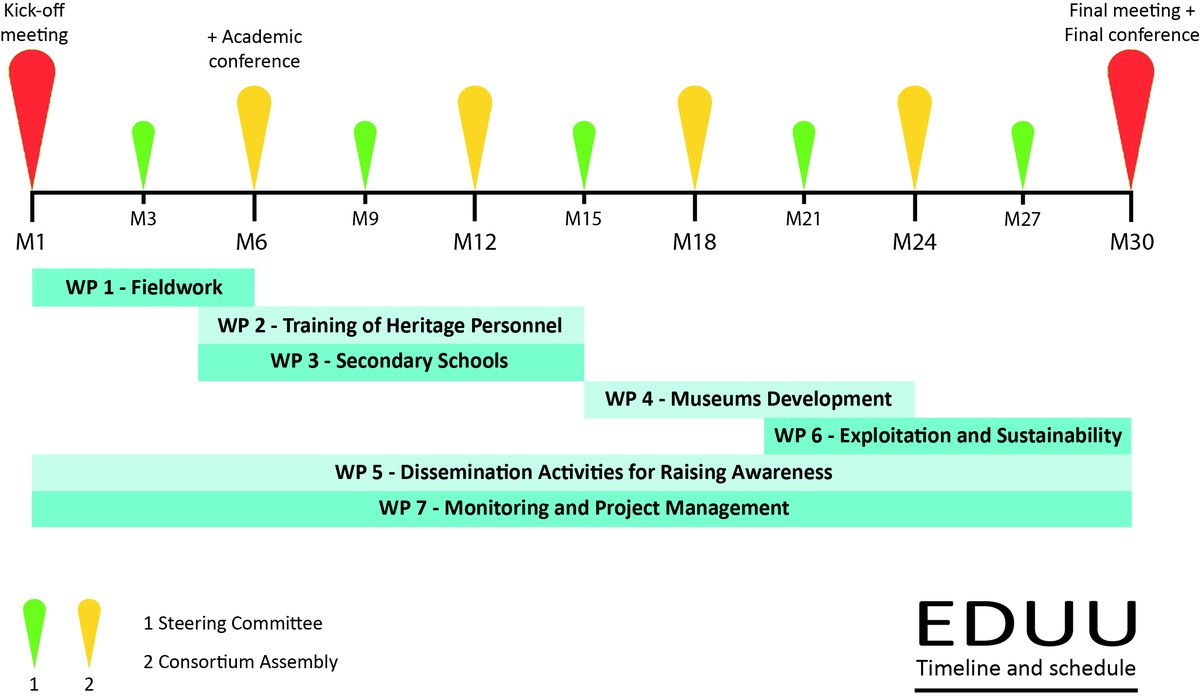The project workflow was structured according to seven different Work Packages:
Work Package 1 - Archaeological, Cultural and Environmental Research
WP LEADER: University of Bologna (UNIBO)
GENERAL AIMS:
1) To increase the knowledge of pre-Islamic societies in Iraq through archaeological and environmental research in strategically important areas;
2) To raise awareness on the Iraqi cultural heritage in the national academic community by sharing and disseminating promptly the results of this research.
WORKFLOW: The first part of the WP featured the construction of the collaborative research groups, formed by EU and Iraqi researchers, scholars, and operators. The EU/Iraqi partners carried out archaeological campaigns/surveys in three target areas in Iraq (Wasit, Qadisiyah, Najaf). These joint field researches focused on three theme areas that were better developed by the joint research groups: Ancient landscapes and management of present natural resources; reconstructing pre-Islamic societies and identities; the role of rural communities in preserving heritage sites in southern Iraq. Together with the fieldwork on ancient past, community-based research was carried out by Iraqi universities targeting present communities with the aim of investigating, not only traditional ways of life and coping mechanisms, but also the complexity of behavioral and cultural choices in ways that cannot be deducted from the study of material culture alone.
At the end of fieldwork (WP1), 3 conferences were organized in the 3 partner Iraqi universities, in order to illustrate the results of the research conducted with scholars and students alike. Moreover, 12 academic articles were published to disseminate the outcomes internationally.
Work Package 2 - Training of Heritage Personnel
WP LEADER: University of Turin (UNITO)
GENERAL AIMS: The overall objective of WP 2 was strengthening the capabilities of local cultural heritage operators and community leaders to promote using Iraqi heritage as a tool for dialogue between different sectors of society.
WORKFLOW: WP 2 featured specific training for this cultural heritage personnel from SBAH and community leaders from rural areas targeted with the aim at raising awareness in the communities that live by archaeological sites in order to enhance the degree of safeguarding over cultural heritage. After having selected the candidates, the initial phase of WP 2 consisted of training in the field for SBAH operators and community leaders, carried out during the fieldwork campaigns in the regions of Qadisiyah and Wasit. The training focused on modern techniques for surveying, excavating, recording, cataloguing and conserving. The second stage of WP 2 focused on the organisation of the training courses on cultural heritage management. Courses were organized in different headquarters: in the newly-reopened “Italian-Iraqi Institute of Archaeological Sciences” in Baghdad; in the University of Qadisiyah; and the University of Kufa. EDUU team also developed a training unit “The Museum and the Society. Some Concepts of Collection Management, Communication Strategies and the Educational Impact of Museums” in e-learning (MOOC). Through the creation of the MOOC, uploaded on a free open-access platform (BOOK), freely available online, we aimed at reaching via the web a large number of Iraqi people interested in cultural heritage preservation and management, thus enlarging considerably our pool of final beneficiaries.
Work Package 3 - Workshops for Secondary School Students
WP LEADER: Qadisiyah University (QU)
GENERAL AIMS: The main objective of WP 3 was that of promoting interest in the common cultural heritage and pre-Islamic identity of Iraqi society among younger generations. The target groups of this WP were secondary school students.
WORKFLOW: The first phase of WP 3 featured a selection process of university students from the 3 partner universities in order to single out 90 candidates that subsequently carried out the workshops in the secondary schools. University students were carefully selected by a joint EU and Iraqi committee, formed by university professors. The second step of the WP 3 consisted in defining the topics that were covered during the workshops carried out in schools. Then, teaching materials (in Arabic) for training was developed on the basis of new fieldwork results and according to the three research pathways followed in WP 1. The overall aim of this task was that of stimulating a dialogue upon the importance of the pre-Islamic civilizations that shaped not only the land in which the Iraqi people inhabit today, but also contributed to shape social landscapes. A further course of action that we envisaged for this WP is that of organizing school trips in the heritage sites targeted by the fieldwork of WP 1.
Work Package 4 - Development of Museum Learning Itineraries
WP LEADER: University of Turin (UNITO)
GENERAL AIMS: Create strategies for empowering local and national museums that aim at highlighting the importance of Mesopotamian civilizations for promoting a sense of modern Iraq based also on the shared pre-Islamic identity.
WORKFLOW: The first stage of WP 4 consisted of the assessment of potential development points in the museums of Baghdad (Iraq Museum), Kufa, and Diwaniya, with the aim of promoting the importance of regional history as part of a shared past bonding the local communities and their territories. Then, we proceeded to design and develop the learning itineraries and materials based on fieldwork results and the goals of the project. Once installed, we tested the new learning itineraries by organizing pilot visits for secondary school students and community leaders in order to evaluate the effectiveness of the new materials.
Work Package 5 - Dissemination Activities for Raising Awareness
WP LEADER: University of Baghdad (UoB)
GENERAL AIMS: The goal of this WP was that of making the project’s action visible for large audiences, and in particular, to involve the Iraqi society at large in the activities of the project to foster dialogue across different social sectors.
WORKFLOW: Dissemination was implemented by making use of digital and web technologies, as well as by means of networking meetings, conferences and workshops. An English language project website was developed by UNIBO. At the same time, EDUU accounts were created on several social networks, both in Arabic and in English language, in order to further promote the project activities to the wider public, in Iraq and globally. Two main conferences were organized to disseminate fieldwork results: a general academic conference was organised after the completion of fieldwork at the UoK and at the closing of the project, a final conference will be organized at UoB. The partners organised open days in each secondary school selected for workshops in order to have trainees present to their families the activities carried out. In order to disseminate activities carried out by museum institutions, we created a marketing campaign to attract visitors and we organised guided tours curated by the students associations, under guidance of the Italian UNESCO Youth Committee.
Work Package 6 - Exploitation & Sustainability
WP LEADER: University of Kufa (UoK)
GENERAL AIMS: Create activities to ensure durability of the actions undertaken over time
WORKFLOW: In order to link more closely university and secondary schools’ students, we created one student association, involving 15-24 yrs old, modelled upon the framework of the UNESCO Youth Committee. Three cultural associations were created in Baghdad, Kufa and Diwaniya in order to participate in museum activities. Target of these associations was the civil society and community leaders. Furthermore, two workshops were organized by the newly-established school association at the Ministry of Culture, Tourism and Antiquities in order to illustrate the activities conducted in schools and universities and to convey the message of the importance of this action to policy makers.
Work Package 7 - Monitoring & Project Management
WP LEADER: University of Bologna (UNIBO)
GENERAL AIMS: The overall aims of WP 7 were the effective financial and administrative project management, and the monitoring of the quality of the project’s activities.
WORKFLOW: The activities of WP 7 were implemented throughout the timespan of the project and in parallel with the other WPs. A series of measures was established to make sure that Iraqi partner received adequate training to effectively manage project activities and report expenses. Firstly, 6 administrative officials from 3 Iraqi partner universities participated to a 1 week training workshops led by UNIBO in Bologna. Secondly, UNIBO employed a project manager that supported activity Iraqi partner Universities in meeting their financial and administrative duties. Lastly, one external financial auditor was subcontracted by UNIBO to guarantee professional monitoring of the finances.



